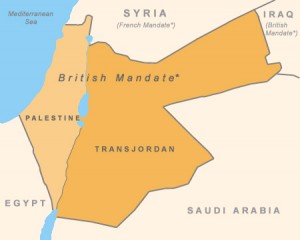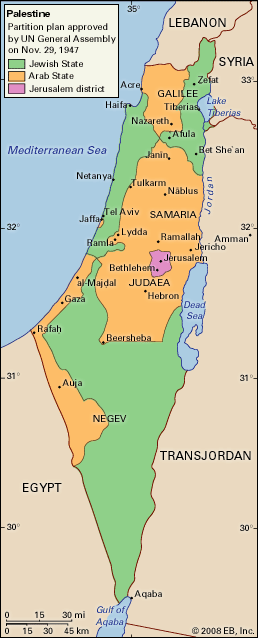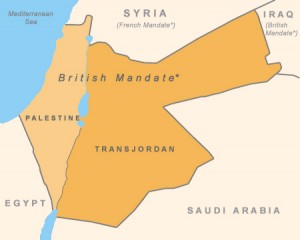The America that inspires people all over the world is the America of Frank Capra’s “It’s a Wonderful Life” and Ben Afleck’s “Argo.” It is a place where people can rise from humble origins to run companies or become President. It is the country of Carnegie, Ford, and Edison, of Warren Buffet, Bill Hewlett, Dave Packard, Steve Jobs, and Meg Whitman and the country of Lincoln, the Roosevelts, the Kennedys, Reagan, Bill and Hillary Clinton, and Barack Obama. These men and women inspired and continue to inspire people here in the United States and also in Europe, Asia, Africa, and the Middle East, including Israelis, Palestinians, Arabs and Persians. They inspire people who want freedom and opportunity, a better life for themselves and their children.
This is “American Exceptionalism.” It is not that Americans are better, but that America is better.
And Israel, Palestine, and the Arab Spring …
Palestine as proposed by the United Nations.
Map courtesy of MidEast Web . org
In Obama, the Arabs and Persians see a man, an African American – who’s father was African – who was raised by his single mom and grandparents, who went to Columbia University and Harvard Law. They can’t help but say to themselves “I wish I could have done that. Maybe my son will do that.”
The young people of today’s Middle East want to feed and clothe and educate their children. Yet while educated they have no jobs. Outside of Gaza and the West Bank they have no existential quarrel with Israel. Inside Gaza and the West Bank, where they have a quarrel with Israel, they want to feed and clothe and educate their children and give them opportunities. According to Y NET, “Palestinian President Abbas said that Palestine has come to the UN because it believes in peace…. Palestine has come to the international community in light of the fact that they believe this is the last chance for the two-state solution.”
According to The Guardian, Abbas said,
“There will be no return to armed struggle. It will destroy our territories and our country.” Hamas itself, he argued, “is not resisting” – a reference to the organisation’s effective ceasefire since January last year – “and now they are talking about peace and a truce with Israel”.
On 29 November, 2012, the delegates to the United Nations General Assembly representing their countries voted to elevate the Palestinian delegation. In so doing, the delegates reaffirmed Resolution 141 of 29 November, 1947, which partitioned the western part of Palestine into a Jewish state, an Arab state, and defined Jerusalem as an international city. (The British had created what they called “Transjordan,” and what is now known as the “Hashemite Kingdom of Jordan” out of eastern part of Palestine in 1922, see Wikipedia / Palestine Facts). The Jews in western Palestine accepted the vote and declared their state Israel. The Arabs in Eastern Palestine rejected the concept and were pushed into refugee camps by the armies of Egypt, Jordan, Syria, Iraq, Saudi Arabia, and Israel. Jordan occupied the West Bank and Jerusalem from 1948 to 1967. Egypt occupied Gaza from 1948 to 1967. Israel occupied other pieces of what was to have been Arab Palestine to give itself contiguous borders from 1948 on and in the Six Day War, in June, 1967, Israel annexed East Jerusalem and occupied the West Bank and Gaza.
Map of post WW I British Mandate of Palestine
Palestine in the east and “Transjordan” in the west.
Courtesy Israeli Palestinian Pro Con . org
If Israeli Prime Minister Benjamin “Bibi” Netanyahu had vision, like Prime Ministers David Ben Gurion, Golda Meir, and Menahem Begin he would understand that Israel exists in the Middle East – northeast of Egypt, west of Jordan, south of Lebanon and southwest of Syria and close to Iran, Iraq, Saudi Arabia and Turkey.
If Netanyahu had vision, like former Prime Minister Ehud Olmert, he would see that the “Arab Spring” is an unstoppable force, like Arab Nationalism, other post-WW II anti-Colonial movements, and the Zionist movement of the 19th and Early 20th Centuries. And like the Zionist movement, the Arab Spring has the potential to be democratic.
 If Netanyahu had vision he would see that despite Egyptian President Mohammed Morsi’s apparent moves to become the next dictator of Egypt, the movement which toppled dictators in Tunisia, Libya and Egypt, the movement will topple the Dictator in Syria, and could topple the regime in Iran, is inspired as much by American history.
If Netanyahu had vision he would see that despite Egyptian President Mohammed Morsi’s apparent moves to become the next dictator of Egypt, the movement which toppled dictators in Tunisia, Libya and Egypt, the movement will topple the Dictator in Syria, and could topple the regime in Iran, is inspired as much by American history.
If Netanyahu had vision he would see that negotiations with Abbas would hurt Achmadinejad and the Iranian regime as much as they could help Israel and the Palestinians.
If Netanyahu had vision he would seek to find common ground and would welcome the changes in the Arab and Moslem Middle East with (guarded) optimism and say. “Our struggle for national liberation has been fought by the same dictators who have oppressed you; who promised you freedom from colonialism of the 19th and early 20th Centuries and delivered slums, dictatorships, prisons, bullets, chemical weapons, and wars with us: Bashir and Hafez Assad in Syria, Nasser in Egypt, Saddam Houssein in Iraq, Gadaffi in Libya, Achmadinejad and the radical Shia in Iran.
If Netanyahu had vision he would see that Nasrallah wants war but Abbas wants peace.
If Netanyahu had vision he might withdraw from the West Bank as Ariel Sharon withdrew from Gaza in 2005 and negotiate with Abbas as Manahem Begin negotiated with Sadat.
If Netanyahu had vision he would say to the Israelis,
“The Palestinian Authority under Yasir Arafat was corrupt. And Nasrallah, elected in Gaza because the PA was corrupt and incompetent, has delivered hospitals and schools. But, he could add, Nasrallah and Hamas have delivered poverty, bombs, and early graves. Arafat is dead and gone. But his vision lives on – it is Nasrallah’s vision. Abbas has a different vision. And while there is corruption in the Palestinian Authority there is also corruption in Israel.”
If Netanyahu had vision he would turn to the Palestinians and say,
“It is hard for us to forget all the blood that has been spilled. As we know it is hard for you. But looking to the future, we wish to welcome, with guarantees from the US, the UN, and the international community, a peaceful Palestine. Salaam Alikim.”
But while Netanyahu, the former paratrooper and MIT-educated former consultant, is smart, aggressive and tough, and probably believes himself to be realistic, it seems to me, writing comfortably from the United States, that the Israeli Prime Minister lacks vision.
–
I would be willing to work as a mediator to help the Israelis and the Palestinians reach common ground to resolve this dispute. I hold a Bachelor’s in Biology and an MBA in “Managing for Sustainability” from Marlboro College. I can be reached at ‘L Furman 97” @ G Mail . com and US 732 . 580 . 0024.



